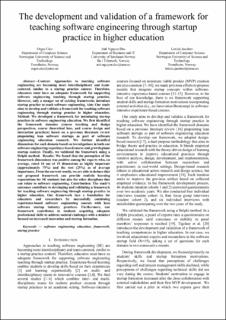| dc.contributor.author | Cico, Orges | |
| dc.contributor.author | Nguyen Duc, Anh | |
| dc.contributor.author | Jaccheri, Maria Letizia | |
| dc.date.accessioned | 2022-02-16T13:03:50Z | |
| dc.date.available | 2022-02-16T13:03:50Z | |
| dc.date.created | 2021-11-30T06:42:41Z | |
| dc.date.issued | 2021 | |
| dc.identifier.issn | 1539-4565 | |
| dc.identifier.uri | https://hdl.handle.net/11250/2979389 | |
| dc.description.abstract | —Context: Approaches to teaching software engineering are becoming more interdisciplinary and teamcentered, similar to a startup practice context. Therefore, educators must have an adequate framework for supporting software engineering teaching through startup practice. However, only a meager set of existing frameworks introduce startup practice to teach software engineering. Aim: Our study aims to develop and validate a framework for teaching software engineering through startup practice in higher education. Method: We developed a framework for introducing startup practices in software engineering education. We first identified the framework domains (course teaching and design perspectives, course theoretical lens, and course design and interaction practices) based on a previous literature review pinpointing lean software startups as part of software engineering education research. We further identified dimensions for each domain based on investigations in both our software engineering experience-based course and growth phase startup context. Finally, we validated the framework using a Delphi method. Results: We found that the perception of the framework dimensions was positive among the experts who, on average, rated 14 out of 19 dimensions as highly important (approximately 75%) and the rest (25%) as of average importance. From the current results, we are able to deduce that our proposed framework can provide realistic learning expectations for SE students but also for other disciplines that can relate to software engineering. Contribution: The study's outcomes contribute to developing and validating a framework for teaching software engineering through startup practice in higher education. Our framework lays a foundation for educators and researchers by successfully combining experience-based software engineering courses with lean software startup industry practices. Furthermore, our framework contributes to students acquiring adequate professional skills to address societal challenges with a mindset focused on increased innovation and startup formation. | en_US |
| dc.language.iso | eng | en_US |
| dc.publisher | Institute of Electrical and Electronics Engineers (IEEE) | en_US |
| dc.relation.uri | https://ieeexplore.ieee.org/xpl/conhome/1000297/all-proceedings | |
| dc.title | The development and validation of a framework for teaching software engineering through startup practice in higher education | en_US |
| dc.type | Peer reviewed | en_US |
| dc.type | Journal article | en_US |
| dc.description.version | acceptedVersion | en_US |
| dc.rights.holder | © IEEE. Personal use of this material is permitted. Permission from IEEE must be obtained for all other uses, in any current or future media, including reprinting/republishing this material for advertising or promotional purposes, creating new collective works, for resale or redistribution to servers or lists, or reuse of any copyrighted component of this work in other works. | en_US |
| dc.source.journal | Conference Proceedings - Frontiers in Education Conference | en_US |
| dc.identifier.doi | 10.1109/FIE49875.2021.9637256 | |
| dc.identifier.cristin | 1961311 | |
| dc.relation.project | Norges forskningsråd: 274816 | en_US |
| cristin.ispublished | true | |
| cristin.fulltext | preprint | |
| cristin.qualitycode | 1 | |
